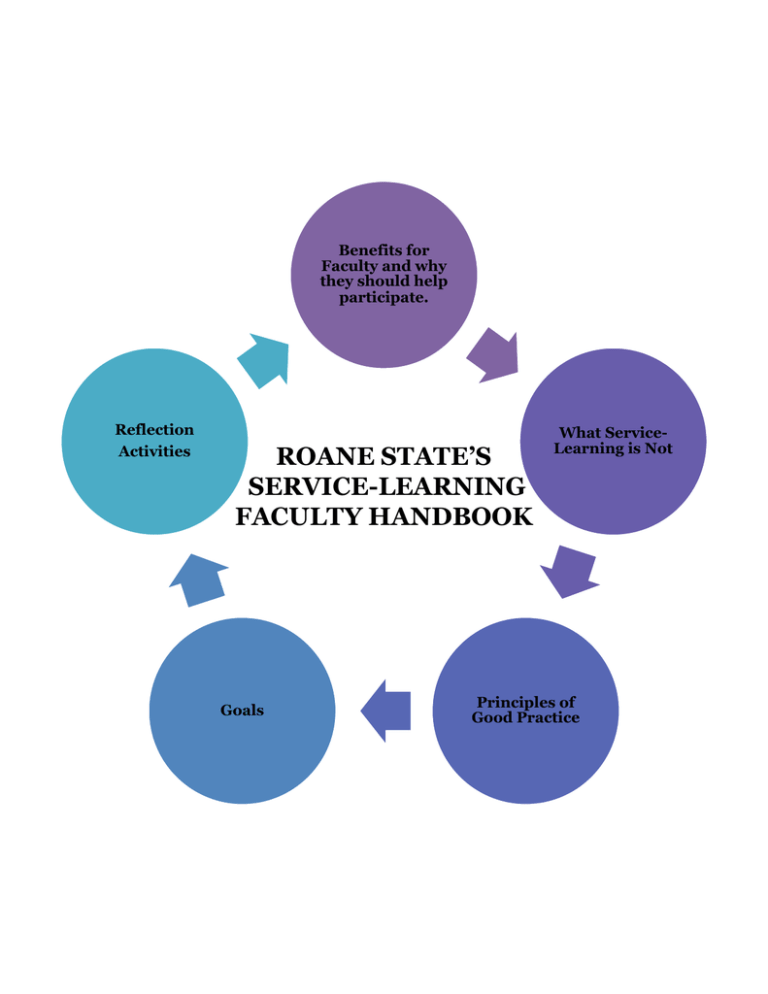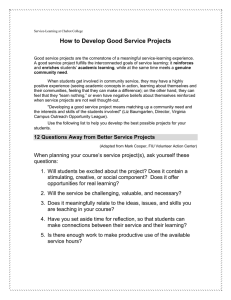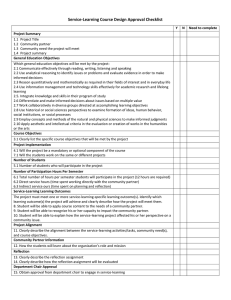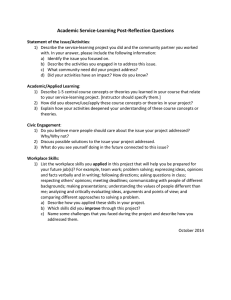Benefits for Faculty and why they should help participate.
advertisement

Benefits for Faculty and why they should help participate. Reflection Activities ROANE STATE’S SERVICE-LEARNING FACULTY HANDBOOK Goals What ServiceLearning is Not Principles of Good Practice What exactly is Service-Learning? SERVICE-LEARNING is a blending of academic study and community service. Academic credit is g given for the actual learning g that occurs during g the volunteering and not just for the clock hours of service to the community. Students can choose to be placed in one of many available nonprofit agencies, educational sites, and government offices. They are then given specific assignments, based on both an academic learning plan and the specific need of the community site. What Service-Learning Is Not! VOLUNTEERISM—where primary emphasis is on the service being provided primaryy intended b beneficiaryy is clearlyy the service recipient. p and the p COMMUNITY SERVICE—where the primary focus is on the service being provided as well as the benefits the service activities have on the recipients. INTERNSHIPS—that engage students in service activities primarily for the purpose of providing students with hands-on experiences that enhance their learning or understanding of issues relevant to a particular area of study. FIELD EDUCATION—that provides students with co-curricular service opportunities that are not related, but not fully integrated, with their formal academic studies. How Do I Demonstrate What I am Learning i and d How Am I Graded? d d You demonstrate what you are learning by what you write in your reflective journal, your verbal exchanges with your faculty supervisor, and your final analytical paper. The site placement coordinator will also be in contact with site supervisors who will provide a further assessment of your progress. Each participating faculty supervisor will tell you ahead of time what their basic requirements are for a specific grade. Why should you as FACULTY work with me as a VISTA with Service-Learning? Service-Learning is a way to address the growing level of interest and sense of urgency about the community and public service issues. Service-Learning enriches and enlivens teaching. It changes your role from the expert on top to the expert on tap, and with that change you’ll enjoy a new relationship with your students and a new understanding of how learning occurs. As you connect the h community i with ih the curriculum, you’ll become more aware of current societal issues as they relate to your academic areas of interest. Faculty has the opportunity to identify new areas for research and publication, and thus increase opportunities for professional recognition and reward. The Principles of G dP Good Practice ti The Service-Learning course should be rigorous and challenging. 1.)Academic credit is for learning, not for service. 2.)Do not compromise academic judgment. 3.)Set learning goals for students. The service experience should enhance student learning. 4.) Establish criteria for the selection of service placements. 5.) Provide educationally sound educationally-sound mechanisms to harvest the S-L. 6.) Provide supports for students to learn how to harvest the service-learning. 7.) Minimize the distinction between the student’s S-L role & the classroom learning role. Teaching a S-L course offers new opportunities for faculty. 8. Re-think the faculty Goal: Help Students Make the Connection Service-Learning g can expose p participants p p to new concepts, procedures, events, people, experiences, and places; but without processing the experience no learning will occur. Reflection is one of the most important tools necessary to ensuring a successful service-learning experience. When considering the service-learning component of your syllabus it is important to think about what type of reflection activities will best help p students make the connections and get the most out of their service-learning. Journals Art Focused Projects In-Class Presentations Responses to Course Readings Email Discussion Di i Groups Videos Reflective Activities Writing Portfolios Responses to O t id Outside Reading Essays Individual or Group Projects Group Discussions Reflective Papers




